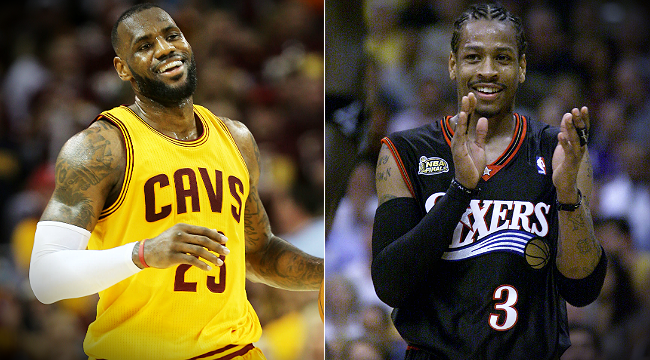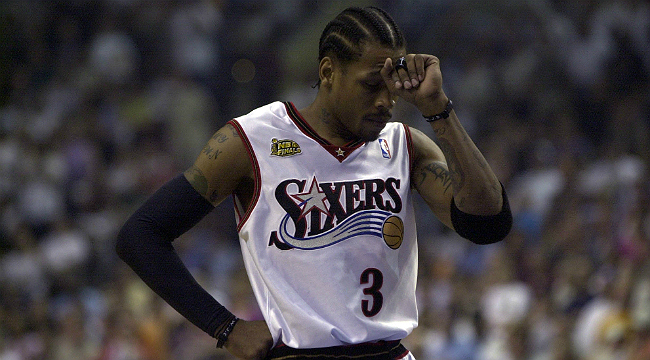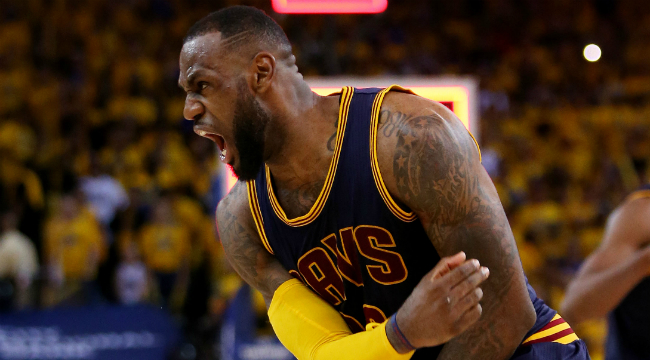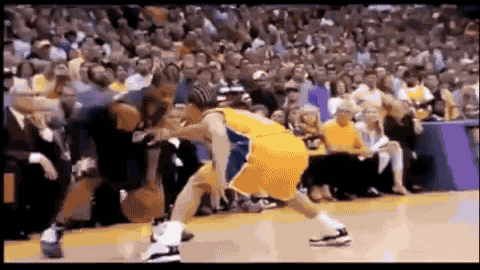
Out of the Western Conference emerged a rampaging force, a death machine hell-bent on destruction, driven by a singular player whose very presence on the court induces panic in opposing coaches and fans, added by an offensive gameplan executed with precision. On their way to coronation in the NBA Finals, they met a ragtag bunch from the Eastern Conference, with precious few above-average players, hopelessly dependent on their one transcendent star to drag them across the finish line with the rest of the roster tied to his ankle like a ball and chain.
No one gave the David much of a chance against the Goliath — until the games started being played. Is he actually good enough to beat that juggernaut all by himself? For a game or two at least, yes. Yes, he was.
* * *
Let’s just loop the best bit, because it’s still one of the most baller moves in NBA Finals history. You know it, you love it: the step-over.
Most still didn’t think the 76ers had a chance against the Lakers in the 2001 NBA Finals, but no one wanted to be in earshot of Allen Iverson when they voiced those doubts. Unfortunately for all non-Lakers fans, the Sixers actually didn’t have a chance. After Iverson scored nearly half of Philadelphia’s points in their Game 1 overtime win, the Lakers woke up and played like the all-encompassing force they had been in the Western Conference playoffs, where they lost exactly zero games. Derek Fisher, Robert Horry and Rick Fox combined to shoot 53 percent on three-pointers, Shaq averaged 33 and 16, and the rest was fairly clinical.
But it was Iverson who was the (tragic) hero of those Finals. He finished 37.6 percent of the Sixers’ possessions (surpassed only by LeBron James’ 40.8 from this year’s Finals), averaged an inhuman 47 minutes per game, and still had fewer turnovers than either of the Sixers’ other primary ballhandlers, Eric Snow and Aaron McKie. Even taking over 100 more shots than anyone else on his team, he still had a higher effective field goal percentage than any non-center teammate. Offensively, he might as well have been alone.

Iverson’s lonely offensive duty is the biggest parallel between his 2001 Finals performance and LeBron’s in 2015. Both of them had scrappy, defense-first supporting casts with their second-leading scorers being tall guys who managed to dunk a few times (Dikembe Mutombo and Timofey Mozgov).
Cleveland’s roster deficiencies were starkly different from Philadelphia’s, however. The Cavs built an immensely talented roster that disintegrated over the course of the playoffs due to injury; the Sixers’ only meaningful injury occurred midseason to their primary big man, Theo Ratliff, who they traded for Mutombo. Ratliff was younger and springier, but they were both elite shot-blockers with limited offensive games — Mutombo was more complete defensively, winning Defensive Player of the Year in the regular season, so you could argue they upgraded. Leaving aside Mutombo (which is exactly what Shaq wound up doing in the series), what the 76ers trotted out there in the Finals was just what they had, which was not much.
Bereft of other options, both LeBron and Iverson relied primarily on isolation plays to get their offense, scoring when left alone and passing out of double teams, with a sprinkle of high pick-and-roll with their big men. Iverson may have been a better passer than many people remember, but he certainly was never the genius distributor LeBron is. Then again, even at age 26, Derek Fisher was never a defender of the same caliber as Andre Iguodala (and you know he wasn’t getting any MVP votes).
The similarities between the two stars tend to dry up there, at least on the court (both publicly called themselves the best player in the world). LeBron’s isolation game was post-heavy, leveraging his size to get close enough to offset his inconsistent jump shooting, and AI used his dribble (and that crossover, oh, that crossover) to drive the lane or get space for a step-back jumper. You could argue all day about LeBron’s defense in the Finals, and in the playoffs at large — general consensus seems to concede that he couldn’t have possibly had the energy to reach the defensive heights of his late-Cleveland, early-Miami days, but he was still a damn sight better than Iverson, who mainly checked Fisher (remember how well he shot from deep in the series? Yeah).

LeBron is a more complete player than Iverson ever was, so it’s not surprising that his Cavs took one more game of the Finals than the Sixers did (although that invites the comparison between the 2001 Lakers and this year’s Warriors, which is a really tough one). His leadership of his team goes far beyond Iverson’s, as inspiring and passionate as he was, because of how much he directly contributed to strategy and game planning. Even though they both scored around 35 points per game in the Finals, LeBron nearly averaging a triple-double for the series underscores his all-around impact.
It’s reductive to ask who “carried” their team more between Iverson and LeBron, or to ask who was more impressive in doing so. Both players maxed out their capabilities in valiant, ultimately doomed efforts. The Cavaliers were probably better than the Sixers overall, mostly thanks to LeBron’s more all-around dominance. Iverson’s Sixers barely made it to the Finals, playing two seven-game series to get out of the Eastern Conference and seeming so unlikely that some suggested that David Stern was rigging the games to get AI into the Finals for ratings purposes. Cleveland, on the other hand, went 12-2 in the Eastern Conference as their biggest challenger, Atlanta, also disintegrated (partly) due to injury.
Though Iverson and James couldn’t be more different as players, both of them left observers in awe of their individual efforts. Both players gave as much as they possibly could, falling short of the title but proving their heart and will. Both of them earned the NBA’s respect, even more than they had before. And they gave two of the most memorable losing efforts in NBA Finals history.







